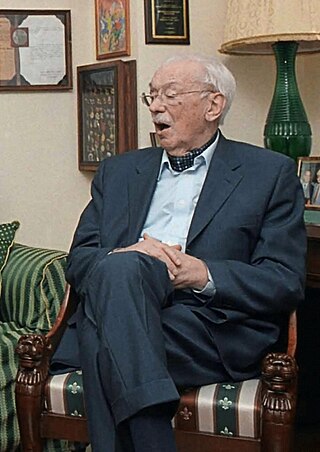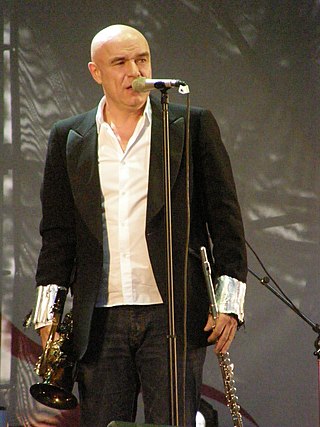
Puppetry is a form of theatre or performance that involves the manipulation of puppets – inanimate objects, often resembling some type of human or animal figure, that are animated or manipulated by a human called a puppeteer. Such a performance is also known as a puppet production. The script for a puppet production is called a puppet play. Puppeteers use movements from hands and arms to control devices such as rods or strings to move the body, head, limbs, and in some cases the mouth and eyes of the puppet. The puppeteer sometimes speaks in the voice of the character of the puppet, while at other times they perform to a recorded soundtrack.

Sergey Vladimirovich Ilyushin was a Soviet aircraft designer who founded the Ilyushin aircraft design bureau. He designed the Il-2 Shturmovik, which made its maiden flight in 1939. It is the most produced warplane, and remains the second most-produced aircraft in history, with some 36,000+ built, behind the US Cessna 172.

Sergey Vladimirovich Mikhalkov was a Soviet and Russian author of children's books and satirical fables. He wrote the lyrics for the Soviet and Russian national anthems.
Petrushka is a stock character of Russian folk puppetry. It was first introduced by traveling Italian performers in the first third of the 19th century during a period of Westernization in Russian culture. While most core characters came from Italy, they were soon transformed by the addition of material from the Russian cultural context.' Petrushkas are traditionally hand puppets. The character is a kind of a jester, a slapstick protagonist distinguished by his red dress, a red kolpak, and often a long nose.

An Unusual Concert (1946) is one of Sergey Obraztsov's best known puppet shows. It is considered a masterpiece of puppeteering and satirizes bad performers. It appeals both to children and adults.

Yakov Vladimirovich Flier (‹See Tfd›Russian: Я́ков Влади́мирович Флие́р; October 21 [O.S. October 8], 1912 – December 18, 1977 was a Soviet concert pianist and teacher.

Nikolai Zykov is a Soviet and Russian actor, director, artist, designer, puppet-maker, and master puppeteer.
Obraztsov or Obraztsova is a Russian surname. Notable people with the surname include:

Nikolai Zykov Theatre - puppet theatre founded in Moscow by Nikolai Zykov, a Soviet and Russian actor, director, artist, designer, puppet-maker, master puppeteer.

Vasily Ivanovich Kachalov, was one of Russia's most renowned actors. He worked closely and often with Konstantin Stanislavski. He led the so-called Kachalov Group within the Moscow Art Theatre. It was Kachalov who played Hamlet in the Symbolist production of 1911.
Sergey Sangalov is a Russian contemporary artist. Born in Sukhumi in the former USSR and now capital of Abkhazia, he trained in Rostov and is an abstract painter.
Suresh Dutta is an Indian puppet artist, theatre personality and the founder of Calcutta Puppet Theatre, a Kolkata-based theatre group dedicated to puppetry. Born in Faridpur, in the undivided Bengal of the British India, he trained art under Phani Bhushan, a Jatra exponent, and Kathakali under Balakrishna Menon. He has also learnt fusion style of danceform from maestro Uday Shankar. He also learnt Bharatanatyam and Manipuri before moving to Russia, under a scholarship in 1962, to train in puppetry under the Russian puppeteer, Sergey Obraztsov.

Sergey Vladimirovich Mazayev, also known as Mazay, is a musician, singer, songwriter and lead singer of the rock band "Moral Codex". He heads his own production, sound and publishing label Mazay Communications. Honored Artist of Russia. (2010).

Nina Yakovlevna Simonovich-Efimova was a Russian artist, puppet designer and one of the first professional Russian puppeteers. Together with her husband Ivan Efimov she founded the tradition of Soviet puppet theater, acting as the driving force behind the Efimovs' presentations.

Russian puppet theater appears to have originated either in migrations from the Byzantine Empire in the sixth century or possibly by Mongols travelling from China. Itinerant Slavic minstrels were presenting puppet shows in western Russia by the thirteenth century, arriving in Moscow in the mid-sixteenth century. Although Russian traditions were increasingly influenced by puppeteers from western Europe in the eighteenth century, Petrushka continued to be one of the principal figures. In addition to glove puppets and marionettes, rod puppets and flat puppets were introduced for a time but disappeared in the late nineteenth century.
Sergey Vladimirovich Gorbunov was a Russian volleyball player. He competed in the men's tournament at the 1992 Summer Olympics in Barcelona, finishing in seventh place.

Sergey Vladimirovich Grishin was a Colonel in the Soviet Army and Hero of Soviet Union, who served as a partisan during World War II.

Sergey Vladimirovich Kabyshev is a Russian political figure and a deputy of the 8th State Dumas.

Sergei Vladimirovich Bakhrushin was Russian Soviet historian, medievalist and university professor.














